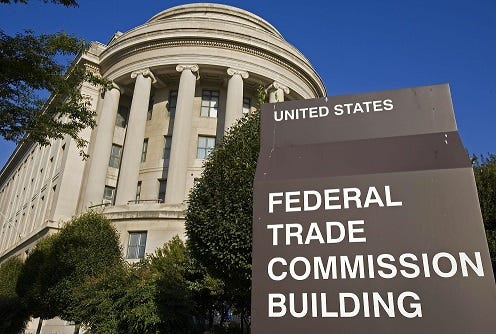Lina Khan, chairwoman of the Federal Trade Commission (FTC) and Biden appointee, loves to throw her weight around. Her latest target: mergers. Her stated rationale is something along the lines of preventing companies from “building up too much power and stifling competition.”
Antitrust regulators have always hated large companies. There’s just something about being “big” that makes their blood boil. Never mind that “big” companies create tons of jobs, contribute $zillions to the economy, and produce the bulk of goods and services that we all crave. And never mind that the government has, on multiple occasions in our history, protected and bailed out large companies deemed “too big to fail.”
Do big companies stifle competition? This accusation deserves some discussion.
The purpose of every business in the world is to make money. And it ain't easy. One of biggest obstacles is competition. It's a never-ending battle. Even if you're the first to come to market with some amazing, incredible new product, it's pretty much guaranteed that, before you wake up tomorrow morning, competitors will be springing up like weeds, invading your turf, and nipping at your heels.
So what do you do? Well, you try to come up with a business plan that mitigates the problem. Every business does this, and has done this, from the beginning of time. The very first businessman in human history was probably a farmer selling corn - but he soon realized that others also wanted a piece of the action.
Business schools offer a course called Corporate Strategy, where they teach budding business moguls how to (hopefully) stay ahead of competitors. The main tools are mergers, acquisitions, partnerships, and marketing agreements. Does applying the techniques learned therein guarantee big profits? Well, sometimes yes, sometimes no. In theory, larger businesses should be able to take advantage of "economies of scale" and operate more efficiently than smaller businesses. But it's never that simple. (Hence the other side of the merger coin: "divestiture") So although Corporate Strategy is good knowledge to have, the bottom line remains unchanged: the businesses that make the best profit are those that run their company superbly, keep their customers happy, their expenses low, and hire good talent and treat them well.
So what’s the problem? Well, the claim is that other wanna-be businesses and startups find it difficult or impossible to compete with the Big Boys. Granted, it can be frustrating for a startup when they cannot get anywhere in a given market because some big company dominates it. So lo and behold, you have anti-trust laws.
What exactly is an anti-trust law? In essence, it says: You must compete! But … don't compete too much!!
Anti-trust is the ultimate example of a law that contradicts itself. As explained above, competition is going to happen, regardless of what the government does. "Competition" is merely the act of trying to gain more market share than the other guy. A well-run company is naturally going to gain more market share than a company that does a poor job. And that's a bad thing?
A deep look at antitrust regulation reveals all sorts of confusing, twisted logic. For example, if a company sells its product for more than its competitors, it can be charged with "price gouging" or "price fixing". If a company sells its products for less than its competitors, it can be charged with "unfair competition". And if it sells its products for the same price as its competitors, it can be charged with "collusion" or "conspiracy". You can't win!
If we truly want to help small businesses and startups, there is a much better option: get government out of the way! Remember those competitors that spring up like weeds? In a healthy economy, you want them – lots and lots of them! A large company might be able to occasionally acquire or merge with a lonely startup, but doing that with a continuous deluge of them is not feasible.
If the goal is to encourage new competitors, then government harassment, in all its forms, must be minimized: bureaucracy, red tape, licensing laws, wage & price controls, endless rules and regulations, and of course taxes and other required “contributions”. All of these make it difficult or impossible to start up a business.
And let us not forget that in some industries, such as mail delivery, public utilities, sports franchises, roads & highways, and others, private businesses are prohibited by law from competing with them. These are your only real “monopolies”, and are so because government has mandated it.
So to all the meddling bureaucrats, and all the wanna-be's crying to the government because it's too hard to compete: nobody has a Constitutionally guaranteed right to market share. Tons of new business startups happen every day, and most of them fail. It's a cold, cruel world out there; always has been, always will be. Yet, throughout history, nations such as ours, with a free-market-based economy, are always the wealthiest.








You know a lot more about this than *I* do!